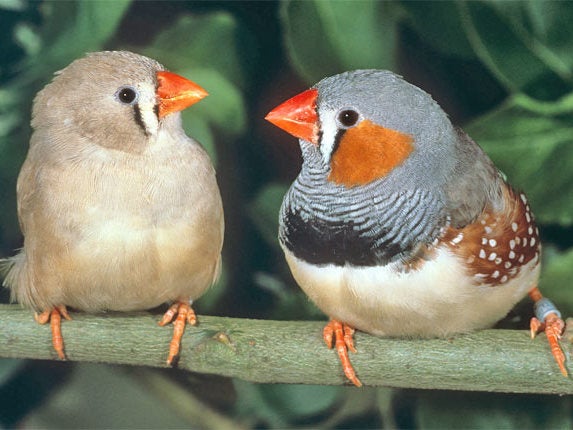The bird that may explain why people are unfaithful

It may not work for Ryan Giggs but as a get-out clause for philandering finches it is just about perfect: I can't help cheating, it's in my genes.
Scientists studying the sexual behaviour of zebra finches have discovered that promiscuity is passed down through generations, providing an insight into how an animal's genetic make-up may influence its willingness to take multiple partners.
Like mourning doves and swans, zebra finches generally form lifelong relationships with a single partner. But small numbers of males and females indulge in frequent extramarital sex.
Such behaviour among monogamous species has often puzzled ornithologists. While the benefits of cheating for the males is clear – offering them an opportunity to spread their genes further than fidelity would permit – females who play away run considerable risks, including the loss of their lifelong partner and a greater vulnerability to sexual diseases.
A new study by German scientists now suggests that cheating among finches may be genetic, with the female offspring of philandering finches much more likely to cheat than their monogamous counterparts.
Researchers at the Max Planck Institute for Ornithology in Seewiesen spent eight years recording the sexual behaviour of a captive population of more than 1,500 finches over five generations. The behaviour was documented on video and then genetic paternity tests were used to determine which finches had sired the most offspring. Unsurprisingly, finches that chose multiple partners tended to sire the largest number of offspring. But their female offspring were also much more likely to cheat.
Wolfgang Forstmeier, one of the study's lead researchers, believes the results highlight how genetic make-up plays a crucial role in dictating sexual-behaviour traits and even passes between the sexes. The study is published in the Proceedings of the National Academy of Sciences of the United States of America.
Subscribe to Independent Premium to bookmark this article
Want to bookmark your favourite articles and stories to read or reference later? Start your Independent Premium subscription today.

Join our commenting forum
Join thought-provoking conversations, follow other Independent readers and see their replies